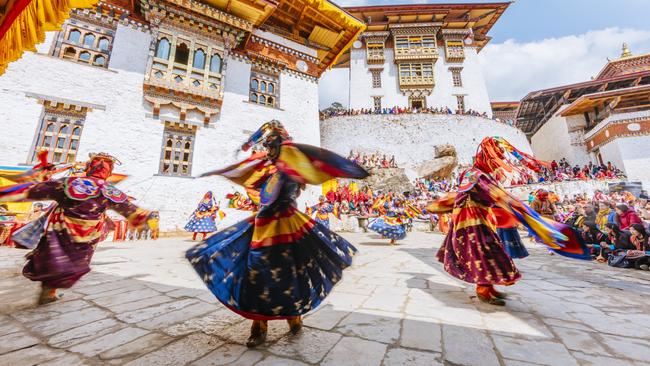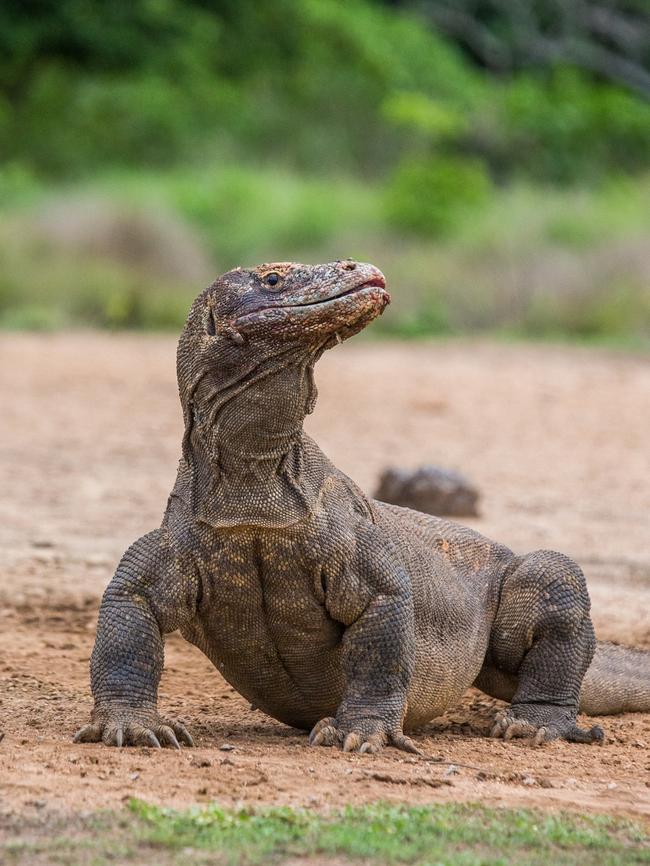Sustainable travel
With prices rising in niche travel destinations, is the era of the cheap overseas holiday over?

On August 1, the cost of seeing a Komodo dragon in the wild skyrocketed from $15 to $365, after a staggering 2330 per cent rise in entry fees to Indonesia’s Komodo National Park. Local tourism operators protested and the hike has now been postponed until January. The move follows a 733 per cent rise in entry fees at Borobudur in Central Java, 1040km west of Komodo and the biggest Buddhist temple complex on Earth.
Bhutan, which was never cheap, reopens on September 23. Following a policy review, foreign tourists will now have to pay the government a sustainable development fee of $US200 ($290) a day – up from $US65 – to explore the land of the Thunder Dragon.
Indonesia and Bhutan are considered niche destinations by many, but there’s growing concern that these and other recent price hikes herald the beginning of the end of the golden age of cheap travel.

In Thailand, Deputy Prime Minister Anutin Charnvirakul told his tourism industry last month not to be tempted to discount in order to attract tourists. “We cannot let people come to Thailand because it’s cheap,” he said. “Hold your ground. Sell premium. The more expensive, the more customers.”
In the Galapagos, a plan to quadruple the $US100 entrance fee is on hold while authorities monitor post-pandemic visitor numbers, and in India the cost of tiger safaris has increased by as much as 123 per cent since 2019. In Peru, it may only be the slow recovery of the trekking industry that has kept Inca Trail permit prices at 2019 levels.
November’s COP27 conference in the Egyptian resort of Sharm El Sheikh, however, could trigger more price hikes as authorities come under public pressure to be seen to be taking action, and over-tourism is a popular, headline-grabbing target.
“Nobody wants a world where travel is a preserve of the privileged,” says Jarrod Kyte at Steppes Travel. “But the current low-value, high-volume model is not only broken but also risks jeopardising travel’s legitimacy as the climate crisis worsens.”
Africa offers a glimpse of the direction of travel. Botswana and Rwanda have long pursued the high-cost, low-volume model, funding conservation while controlling visitor numbers by charging sky-high prices. In 2017 the cost of a 40-minute encounter with a mountain gorilla in Rwanda’s Virunga National Park doubled to $US1500.

“Africa is moving back towards being untouchable for many,” says Rob Slater at British travel company Safari Consultants. “The best way to protect the wilderness is to manage numbers and the way in which the land is explored while at the same time ensuring that the local custodians and the local governments benefit enough from tourism to support and prioritise conservation initiatives. However, it is such a shame if genuine nature lovers can’t get to see the beauty of Africa because there are no reasonably priced options. But who wants to run a lodge for £250 ($430) per person per night when everyone else is charging £1100?”
“The losers here are clearly those on a lower budget, whether they’re backpackers, families, those eking out funds for a long sabbatical or anyone travelling on a tight budget,” says Jonny Bealby at London-based adventure tour company Wild Frontiers.
“Has this made travel more exclusive and a pursuit of the super-rich? Not really, in our view. As with everything it is about priorities – some of our clients will place travel as their No.1 priority and save up to fund that dream trip come what may.”
“Lowering the environmental impact of tourism must be a priority for any destination,” says Raki Phillips, tourism chief of Ras Al Khaimah, the so-called Nature Emirate in the UAE. “But quick fixes like price hikes are a blunt instrument. Better to develop a long-term strategy that benefits environments and communities while also protecting travellers.”

And not just rich travellers, says Pru Goudie, director at industry organisation Adventure Travel Networking. “When he raised the environment levy, the Bhutanese Prime Minister, Lotay Tshering, said his aim was to ‘get a set of tourists who are intellectually high-standing, knowledgeable and conscious of our needs and unique features’. But ‘rich’ doesn’t necessarily mean intellectually high-standing and knowledgeable.”
Turning the world’s wildest and most beautiful locations into ghettos for the wealthy not only excludes a vast section of the travelling public. It also compromises the livelihoods of the guides, hoteliers and restaurateurs in those places who serve the budget end of the market, thus contravening at least five of the UN’s sustainable development goals.
There is a smarter, more inclusive way to fight over-tourism, says Delphine King, chief executive of The Long Run, an association of nature-based tourism businesses focused on sustainability.
“Optimising the positive impact of tourism by creating livelihood opportunities, revenue, support and maintaining interest while minimising access is a very delicate balance,” she says. “But creative approaches could be considered, including fixed-price permits and lottery-based access for more inclusivity and income generation.”
In the meantime, further increases in access, permit, trekking and environmental fees seem inevitable – especially in those Instagram hotspots – and, combined with rising flight prices, they could force your dream trip into the realms of fantasy. The best advice, then, is to book now before the dream drifts out of reach.
“The industry is battered and riddled with debt, so everyone wants maximum income with least possible complications,” Slater says. “This is understandable but dangerous if it becomes the norm. Covid may just have truly swept out the last of the genuine old-school ways.”
THE TIMES

To join the conversation, please log in. Don't have an account? Register
Join the conversation, you are commenting as Logout